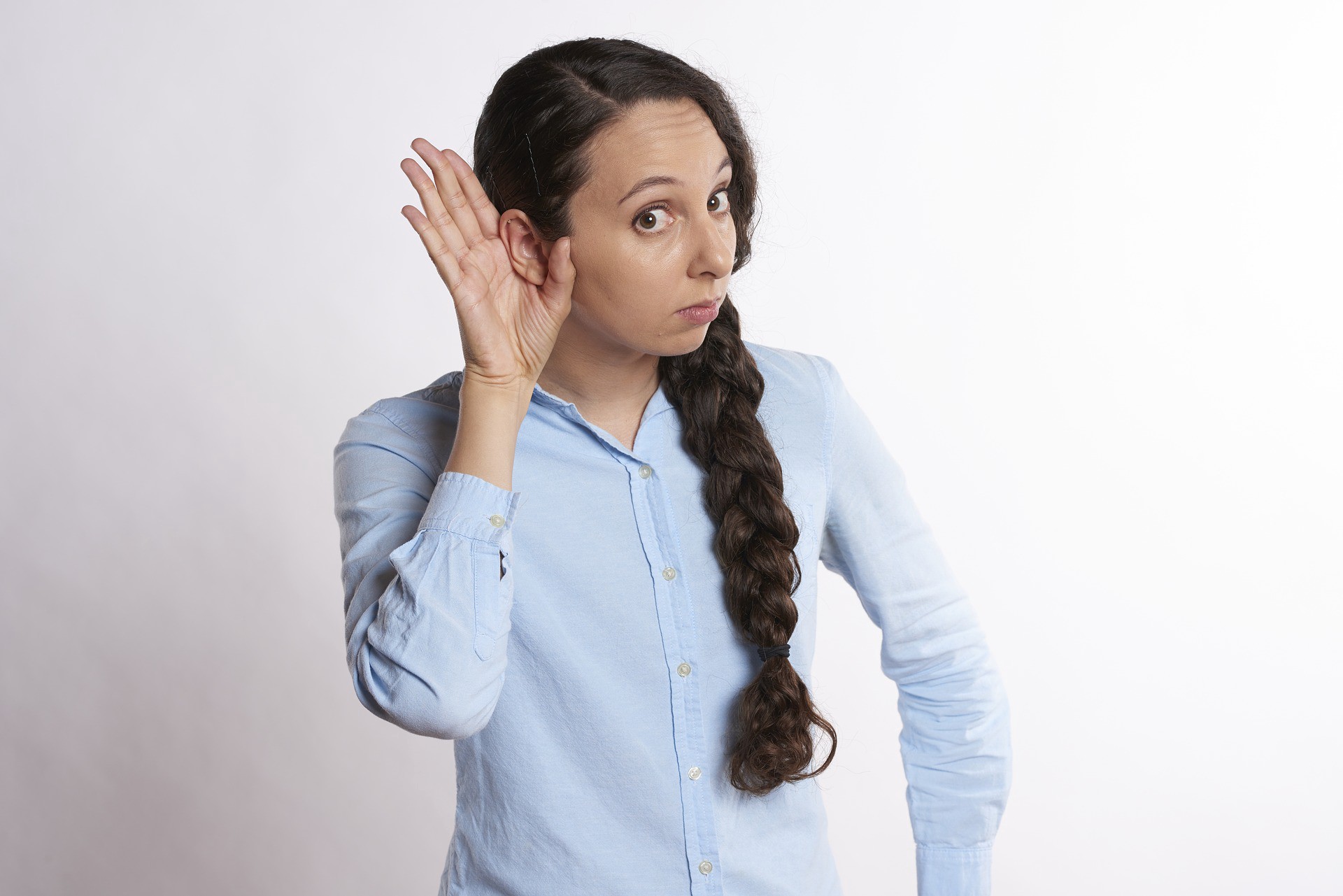
French Listening: Have you ever listened to something in French, and it was like all the sounds ran together, and you had no idea where one word ended and the other began?
Lucky for you, French isn’t known for obscenely long words (I’m looking at you, German).
Then why does this happen?
Between the inexperience of parsing French words, the warp-speed intonation and other complications like silent letters and liaison, French isn’t always what it seems!
But what can you do about it?
Well, as the French say, c’est en forgeant qu’on devient forgeron (it’s by forging that one becomes a blacksmith).
In other words, you need to practice listening to become a good listener. But don’t just practice any old way: you need to practice the smart way.
And here’s how!
Why Is French Listening Important?
Let’s say you’re at a good level of French. You understand most of what you read. You can write a couple of paragraphs about yourself, your life and your surroundings. Maybe you’ve even spoken to a real French speaker, and you made yourself understood. Who cares if you struggle understanding French when it’s not spoken clearly and slowly, right?
Wrong! Improving French listening is crucial for improving your French level as a whole.
Why is that? Well, listening is one of the core four language learning competencies along with speaking, reading and writing. This means that even if the other three skills are strong, you’re missing a piece of the puzzle without listening, and your French won’t be as strong as it could be with better French listening skills. Improving listening contributes to a well-rounded level of French.
Further, since listening is part of the four main competencies of language learning, it’s therefore a skill that’s tested in French language proficiency tests such as the Diplôme d’Etudes en Langue Française (Diploma of Studies in the French Language) or DELF and the Diplôme Approfondi de Langue Française (Advanced Diploma in the French Language) or DALF. In order to do well on those tests, you will need to learn French audio.
Additionally, listening skills are particularly important for growing speaking skills. The two skills are different sides of the same coin. To speak French well, you need to listen to French.
Practicing listening helps you understand native speakers at their natural speed. While native speakers of French may slow down their speech when talking to learners, real French is spoken very quickly. To keep up, you will need a high level of listening skills.
And that doesn’t just count for understanding native speakers! Growing your listening skills helps you understand native media such as French movies, TV shows, radio, music and online media.
Lastly, French listening practice also allows you to remember words better and understand grammar constructions and use them more naturally in your speech and writing. Even passive listening has its perks for mastering the French accent and intonation.
How to Improve Your French Listening Skills
So, we’ve established that you need to improve your French listening skills to disassemble French word salad, but how? Check out the following tips for improving your French listening quickly and effectively!
Listen to the Same Thing Repeatedly
Do you ever hear a song on the radio, get addicted right away and listen to it over and over again? Do you then notice that the song gets stuck in your head, lyrics and all?
This same phenomenon can be used for French listening practice at large.
In fact, listening to something multiple times is crucial for developing understanding. Each time you listen, you get a more complete picture of the entire audio as you learn more words and your understanding moves from the surface level to a deeper level.
Listening multiple times also helps improve your accent and get accustomed to sentence structure. It effectively trains your ear to the flow of the French language and its sounds so that you can produce them better when speaking.
Repetition is also crucial to you learning new vocabulary. With each time you hear a newly-learned word, it gets transferred from your short-term to your long-term memory. I suggest that you keep a list of new words that you review prior to each listening session and that you add to as you encounter new words.
You could also do this same repetition with YouTube videos or French movies to learn French.
Listen with Subtitles
In addition to listening to something multiple times, subtitles are also a great help with understanding. Subtitles allow for a side-by-side (or underneath) transcription in French or translation into English of what you’re hearing. This is invaluable for being able to separate the words from one another and read along as you listen.
Subtitles can also help you to mine for new words, idioms and phrases. As you listen along with subtitles, you can isolate words you don’t know. This allows you to write them down (with proper spelling) and then revisit them later for subsequent activities such as flashcards, writing or speaking practice.
To get the most out of subtitles, I suggest this three-step process. First, listen to your clip using English subtitles. This is essential if at a beginner level so that you can understand what’s being said.
However, don’t use English subtitles for long! On a second listen, use French subtitles and look up words you don’t know. After a few more listens with French subtitles, listen to the audio without subtitles and see how much of it you can understand. The answer will surprise you!
For French listening practice, don’t just settle for any subtitles: aim to get interactive subtitles, ones that are completely clickable.
FluentU uses real-world videos to support your French listening practice.
You can hover over any word in the subtitles of all French videos and get a full translation. Not only that, but you can click on the word for more detailed grammatical information, audio clips and example sentences. Each word can also be turned into a flashcard for later review. As you review the flashcards more and more, your progress bar grows, indicating how well you know a French word.
Now, that’s what I call subtitles that work for you!
We’ll talk more about what FluentU has to offer later in this post, so stay tuned for more information how FluentU can work for you.
Record Yourself and Listen Back
While it may seem counter-intuitive, a great way to improve your French listening skills is to record yourself speaking French.
After listening to something in French, I recommend repeating new words—or even whole sentences and paragraphs—from what you listened to and recording them. Recording software is easily available for your computer, your tablet or your smartphone.
You can repeat the new French words exactly as you hear them in their sentences or you can try to make your own sentences using the new words. Make sure to speak loudly and clearly, and use your best French accent to practice how the words should sound.
Once recorded, listen back and compare your accent to a native French accent. What do you notice? What needs to be improved? By figuring out what you need to work on, you can make a plan.
Over time, you’ll notice that you will be able to fine tune your accent and sound more French as you record yourself and practice with advanced French audio.
Don’t Try to Understand Everything
Let me be clear: When listening to something in French, you won’t understand everything you hear. Period.
It isn’t what you want to hear, but it’s the truth. Besides, there are occasionally times when you’re listening to something in your native language and you don’t understand a word, so this isn’t necessarily a bad thing.
Instead of knowing every single word in French, aim to understand the main idea of a French audio, especially on a first listen. In fact, you should aim to understand the gist of it, so you can home in later.
As you listen to something the second, third and fourth times, write down and translate important words and phrases you don’t understand. Review these often, and refer back to this list as you listen to the French audio subsequent times.
Even if something is challenging, it’s crucial to listen to it all the way through. I strongly recommend that you don’t stop listening to look up a word every time you don’t understand. That breaks the flow of your listening practice and stops you from understanding the audio as a whole. Listening the whole way through is particularly important as you advance from beginner to intermediate French audio resources.
Repeat What You Hear
As we’ve previously mentioned, listening is linked to speaking. That means that when listening to something, you should repeat sentences and words you hear, especially new words that you don’t know yet or the ones you’re in the process of learning.
This can be done in two ways. The first is sporadic, meaning you repeat an unknown word or phrase whenever one comes up. Secondly, you can do a line-by-line repetition where you’re shadowing French.
A line-by-line includes listening to something one line at a time, repeating each line out loud and checking for understanding and pronunciation. This means you listen to a sentence in its entirety, and then you repeat the whole thing in French. You may need to repeat the sentence multiple times to get it right.
This repetition of the native content will improve your accent and your ability to understand and speak French. In fact, you can learn French words quicker by repeating them out loud and using them in the context of real French sentences such as with a French language exchange partner.
Write Summaries of What You Listen To
Whether you watch a movie, listen to a podcast or follow a radio show, write a summary of what you’re listening to after you’ve listened to it or after every natural section. This is a fantastic way to test French listening comprehension.
These summaries could be short or long—even a sentence or two with main ideas included can be an effective summary. You should use vocabulary and sentence structures that were in the audio you listened to. Make sure also to incorporate new vocabulary. You don’t need to include all new vocabulary, but you definitely should include new words that are critical to the main ideas of whatever you’ve listened to.
Writing a summary will help you understand the audio the next time you listen and to be on the lookout for key words. It will also reinforce new vocabulary, grammatical rules and sentence structures.
For added practice, try reading out loud or recording your summary.
Memorize Song Lyrics
Other than French immersion with TV or movies, the most common—and perhaps the most portable—form of audio is music. Why not use this to your advantage and really delve into some great French tunes?
In fact, don’t just passively listen to music: find the lyrics and print them out. You can find the lyrics to many of the most well-known French songs on the internet, and it’s also not uncommon for smaller indie French musicians to post their song lyrics on social media.
While you listen to French songs, follow along with the printed out lyrics to the song. This will allow you to see exactly what’s being said. I also recommend highlighting new words, looking them up in a dictionary and writing their translations in the margins of the lyrics.
After some time of reading—and singing—along, you’ll have memorized the song lyrics! This will allow you to internalize the lyrics’ meaning to learn new words and sentence structure. It can even help to improve your accent as you sing the song out loud with or without the accompanying music.
Read Out Loud
Believe it or not, reading can also be a beginner or intermediate French listening exercise! Simply say out loud what it is you’re seeing on the page or screen while you’re reading, and you’ve got French audio as well as valuable French pronunciation practice at your fingertips.
Reading out loud does two things for listening practice. Firstly, it will aid in the comprehension of the reading as a whole and help you learn new words. Using words actively is a great way to move new vocabulary into your long-term memory, so saying them out loud could speed up this process. You will be more apt to recognize the new words you read out loud the next time you hear them.
Reading out also helps you improve your accent. Your mouth will get used to making tricky French sounds as well as determine which words you need to practice saying more.
Best Resources for Practicing Your French Listening Skills
In the age of the internet, there are many ways to access French listening resources. I recommend using them all! However, you should know what each has to offer and how to use each resource best.











